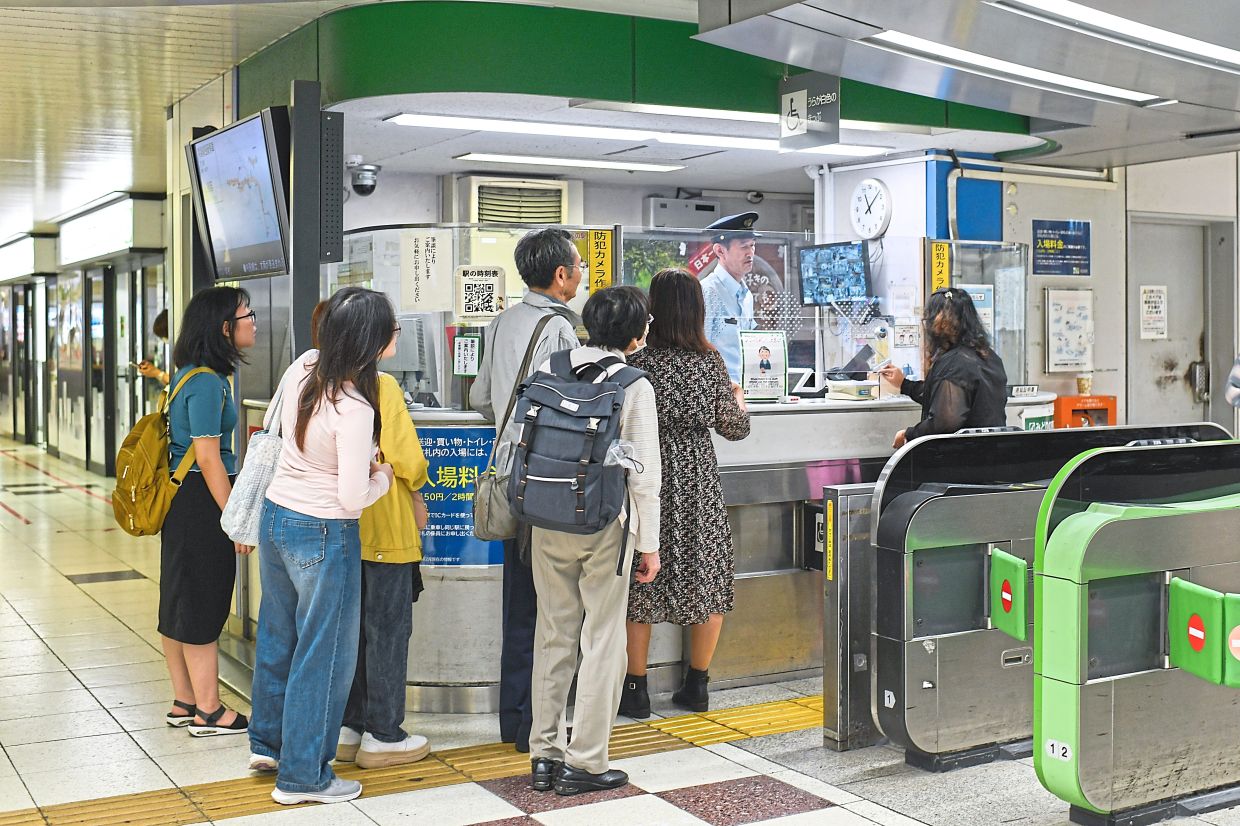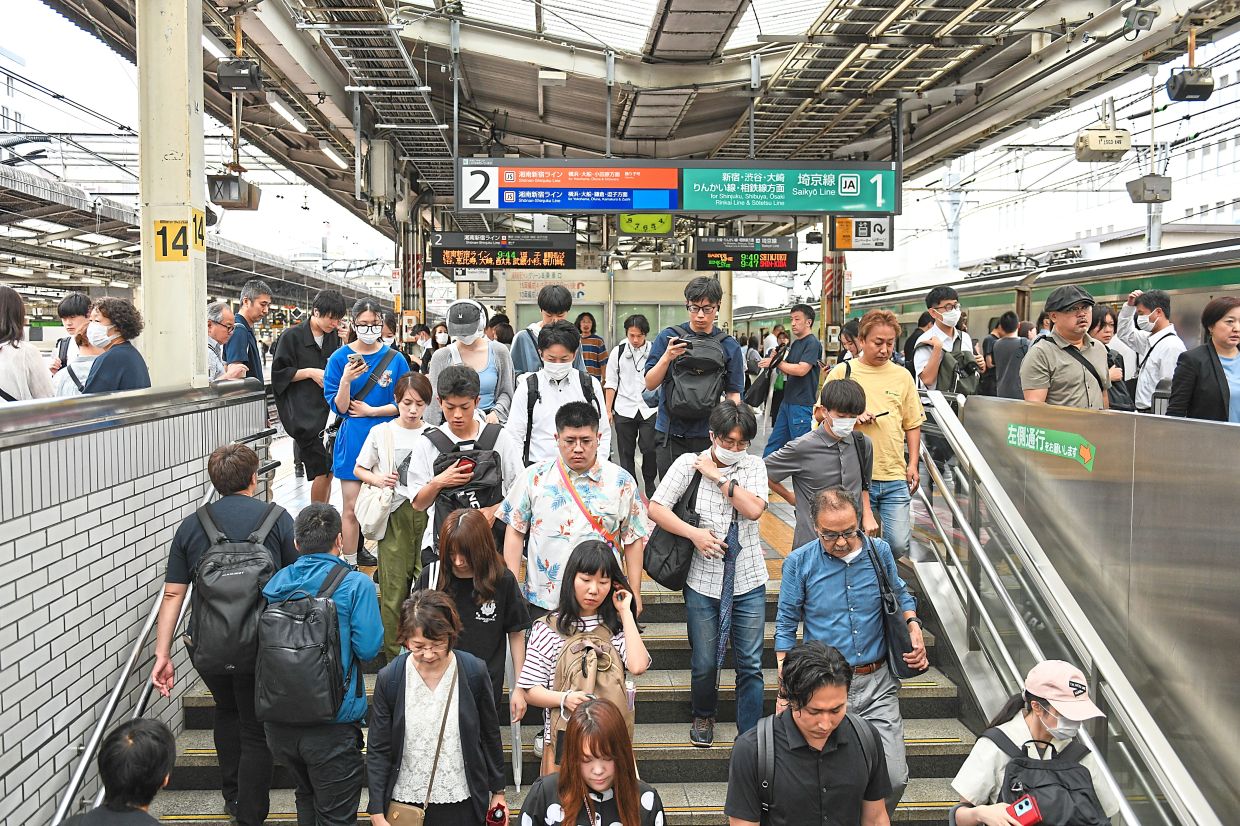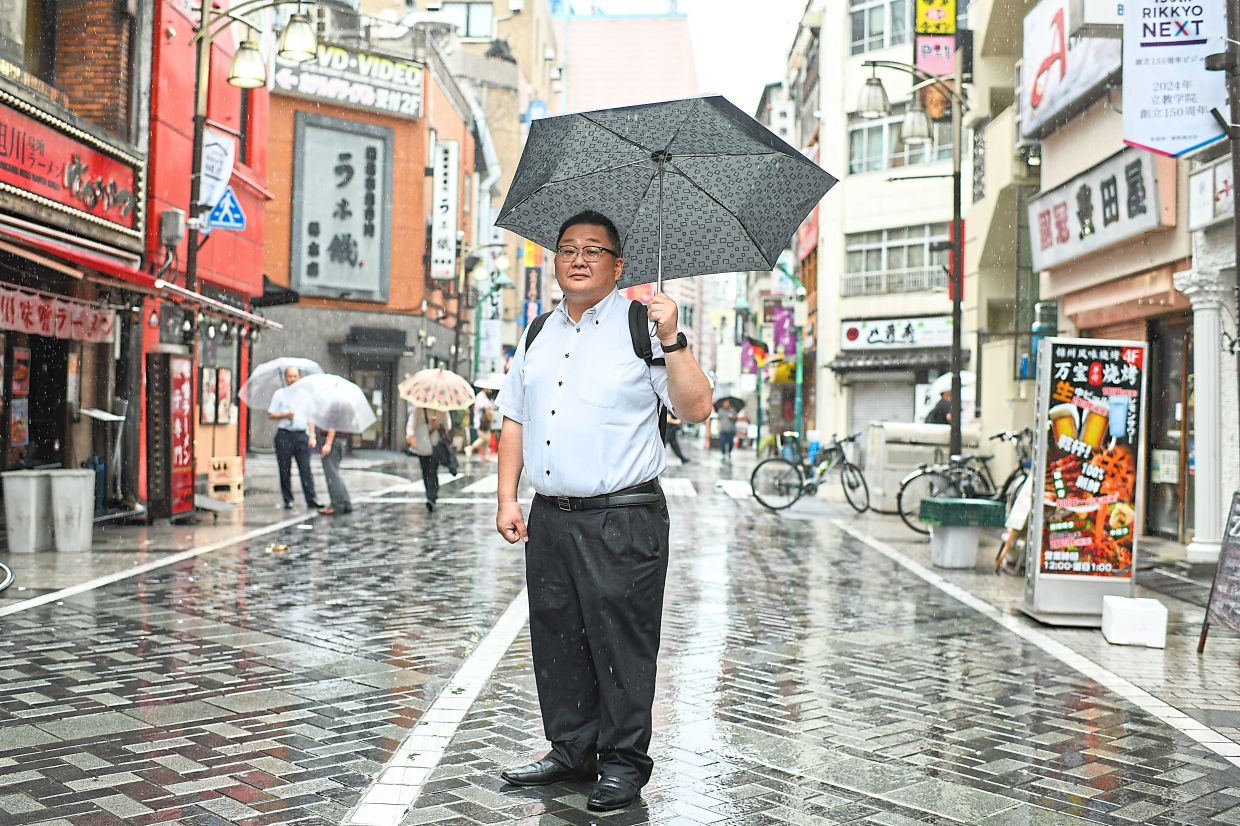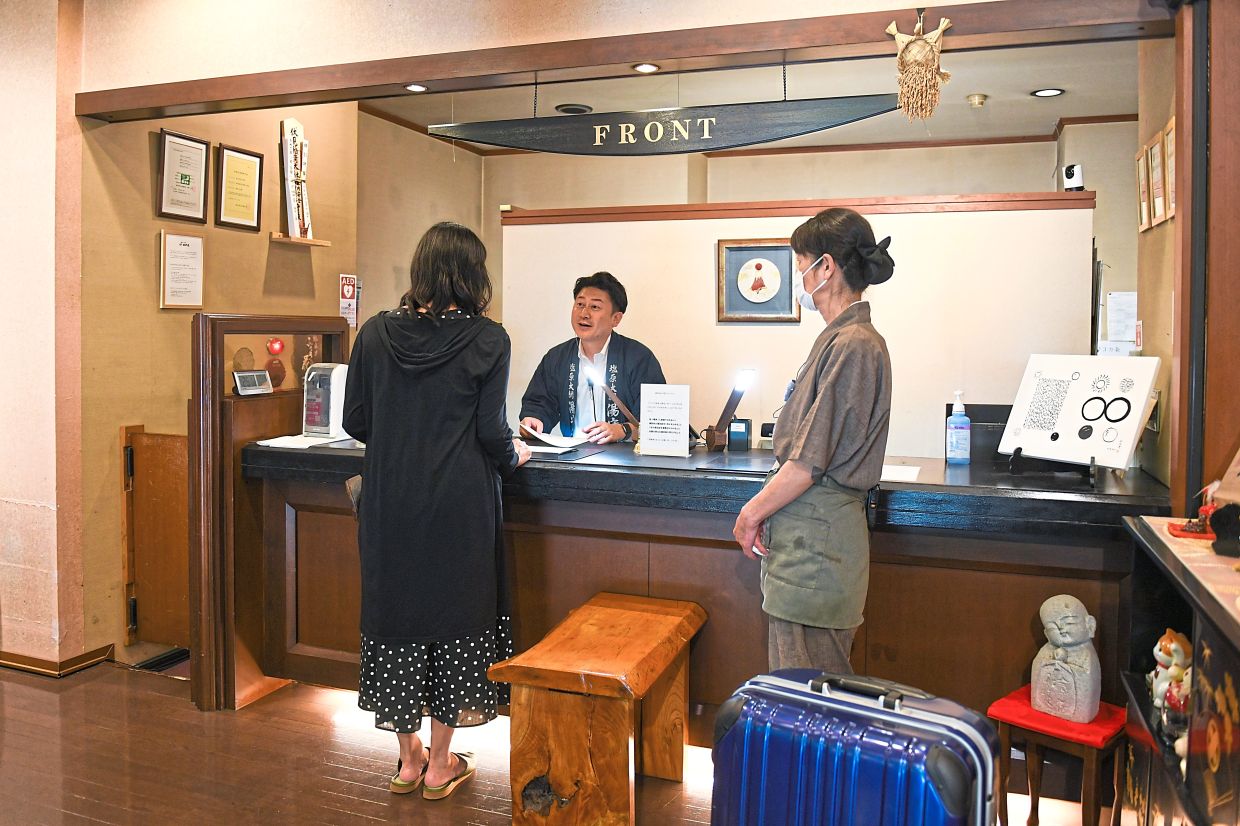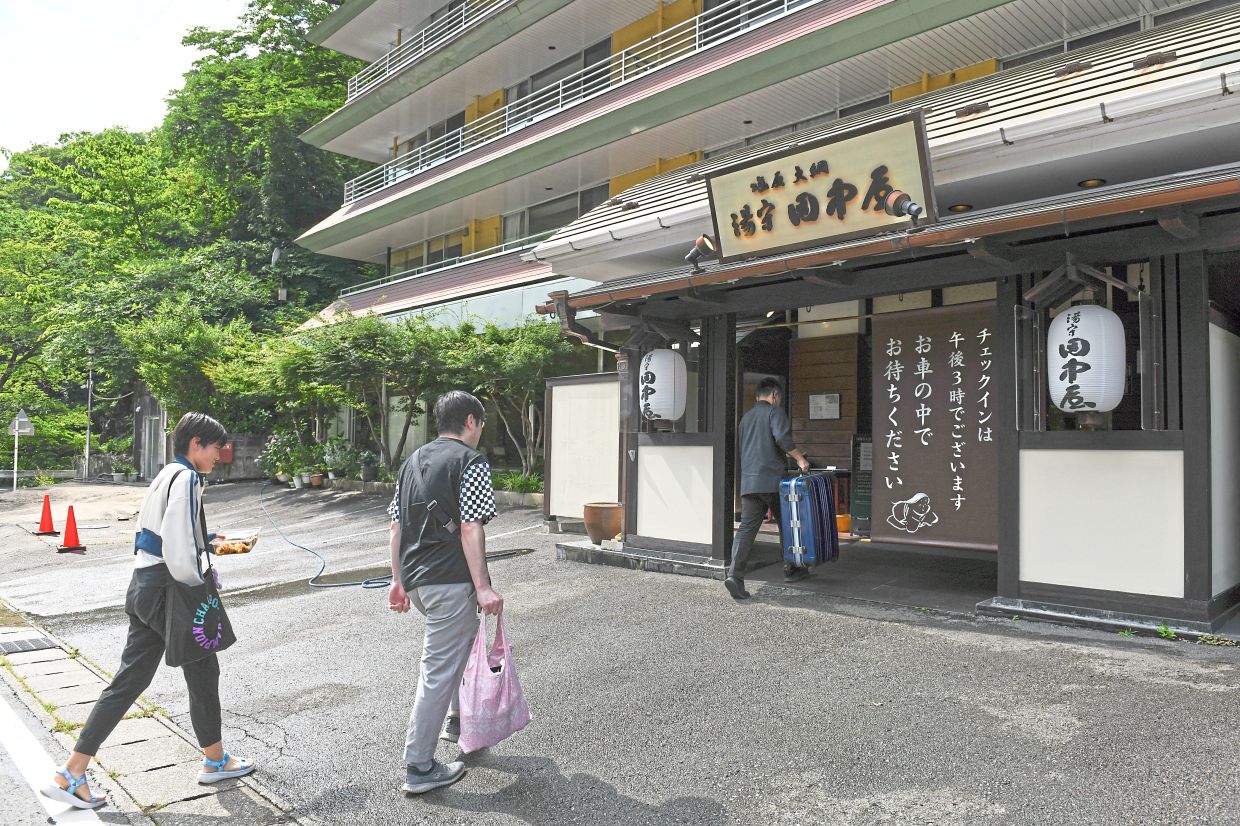Tanaka preparing slippers for guests while his mother Yuki Tanaka shares information about the incoming guests. Recently conducted surveys show up to half of Japanese workers have experienced some form of harassment by a customer. — ©2024 The New York Times Company
THE guests arrived 30 minutes before check-in time at a traditional hot springs inn a couple of hours north of Tokyo. When they saw a sign asking that customers wait in their cars, they demanded to know why they could not get their room key early. The exchange, captured on a security camera, quickly exploded into angry shouting.
It ended on the pavement out front – with the inn’s managing director down on his knees, bowing deeply and apologising.
The incident was an extreme example of what has increasingly come to be known in Japan as kasuhara, an Anglicised abbreviation of “customer harassment”.
Although no country is immune to such behaviour, expectations for service – and the potential for dissatisfaction – are especially high in Japan, where a famous expression exalts the customer as a god.
The tradition of hospitality is such that retail clerks in upscale stores bow to customers on their way out the door, and waiters, baristas and hotel clerks use honorific Japanese when serving.
Whether the abusive incidents are actually increasing is difficult to assess. But after the pandemic’s upheavals, company officials, labour unions and even the government are focusing on the perceived scourge of customer harassment.
The push is all the more urgent as labour shortages have given workers more options to walk away if they feel mistreated.“The mindset has changed,” said Mami Tamura, a member of parliament who recently pressed for a law to hold employers accountable for protecting their workers from customer abuse.
“Now, fewer business operators think the customer is a god.”
Examples that have shown up in the Japanese media have given rise to a sense that customers have finally gone too far.
A diner at a ramen shop northeast of Tokyo dumped 500 toothpicks into his noodles in protest when the owner could not keep up with constant demands for fresh toppings.
The customer proceeded to deluge another branch of the restaurant with so many crank calls that the owner called police, and a court fined the caller.
A viral video showed an enraged bus rider who caused a 25-minute delay as he berated the driver as an “idiot” because he was dissatisfied with seating options.
Another video showed a taxi passenger on the dashcam ordering a driver to apologise repeatedly for slightly overshooting a destination, making her cry.
Based on surveys by the labour ministry and one of Japan’s largest labour unions, anywhere from one in 10 to as many as half of workers have experienced some form of harassment by a customer.
Some companies and service providers have started posting signs warning customers against mistreating workers.
They are drawing up rules to guide staff on what is considered a legitimate complaint and what is simply unacceptable behaviour that can be rebuffed.
Some employers have removed surnames from name tags to protect employees from doxxing on social media.
SoftBank, a technology giant, is developing an “emotion cancelling” voice alteration service that call centres can use to tone down the blast of anger from incoming complaints.
Customers believe “they deserve higher- quality service”, said Shino Naito, an associate professor of labour law and part of an expert panel advising the Tokyo Metropolitan Government on an ordinance that would ban customer harassment.
“Their expectation level needs to be lowered.”
Defining – much less prohibiting – customer harassment can be difficult in Japan, where service staff have traditionally been expected to tolerate any interaction with customers, even indignant ones.
Workers are quick to apologise for any perceived transgression, such as when conductors beg forgiveness if a train is late, or even if it leaves a few seconds early.Such standards of service can come with a rigidity that frustrates customers.
“The Japanese have the attention to detail, and it’s the envy of the tourism and hospitality world,” said Benjamin Altschuler, an associate professor of sport, tourism and hospitality management who is teaching at Temple University’s campus in Tokyo.
“But there’s an inflexibility as well.”Customers may harass employees because they themselves have been abused by bosses or clients in Japan’s often harsh work environments.
They need to “take it out on someone”, said Masayuki Kiriu, a professor of sociology at Toyo University who has studied customer harassment.
Workers for JR East, which operates commuter train lines around Tokyo, say they regularly experience verbal abuse from drunk late-night passengers confused about where to transfer or angry that their fare passes or cellphone apps aren’t working.“I feel like if they don’t get their complaints out with us,” said Takami Matsumoto, who works at a ticket gate, “then they will have to carry them home.”
Until recently, he said, managers told workers any complaints were their fault.
JR East said it provided “support” for workers suffering from mental health issues through “workplace managers and industrial physicians” and was considering guidelines on “how to deal with customer harassment in the future”.
Yuji Tanaka, managing director at Yumori Tanakaya, the traditional Japanese inn where the early arrivals verbally abused the staff, said he wanted to preserve Japan’s “unique” service culture.
But after the recent incident, he took the security camera footage and reported the couple to police, who told him there was not much they could do.
People “just assume service workers should do whatever they want,” he said.
But there are limits: “I also want the other person to respect the service workers.” — ©2024 The New York Times Company
Coping with customer harassment
Workers are quick to apologise for any perceived transgression, such as when conductors beg forgiveness if a train is late, or even if it leaves a few seconds early. — ©2024 The New York Times Company
Commuters speak with workers at Ikebukuro Station in Tokyo on Friday, June 21, 2024. (Noriko Hayashi/The New York Times)
Commuters at Ikebukuro Station in Tokyo. — ©2024 The New York Times Company
Commuters maneuver Ikebukuro Station in Tokyo on Friday, June 21, 2024. (Noriko Hayashi/The New York Times)
Matsumoto near Ikebukuro Station in Tokyo. — ©2024 The New York Times Company
Takami Matsumoto, a Japan Railways employee, near Ikebukuro Station in Tokyo on Friday, June 21, 2024. (Noriko Hayashi/The New York Times)
Tanaka welcoming guests at the reception desk in Nasushiobara, Japan. Early arriving guests recently verbally abused the staff of the traditional Japanese inn. — ©2024 The New York Times Company
Yuji Tanaka, senior managing director of Yumori Tanakaya Hotel, talks with guests at the reception desk in Nasushiobara, Tochigi, Japan, on Saturday, June 29, 2024. (Noriko Hayashi/The New York Times)


